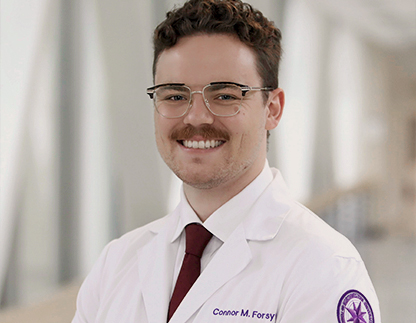My work is centered around the development of new therapies for incurable cancers.”
Connor M. Forsyth
MD/PhD Student in the Medical Scientist Training Program

Connor M. Forsyth is an MD/PhD student in the Medical Scientist Training Program (MSTP) in the Feinberg School of Medicine, pursuing a PhD in the Interdisciplinary Biological Sciences (IBiS) Graduate Program. His interests are in leveraging nanotechnology for the treatment and cure of cancer and the development of next-generation immunotherapy platforms. Connor is a Ryan Fellowship award recipient, which supports outstanding graduate students dedicated to the exploration of fundamental nanoscale science and its benefits to society.
How would you describe your research and/or work to a non-academic audience?
My work is centered around the development of new therapies for incurable cancers. In the Mirkin Lab,
we use nanotherapeutic platforms that allow us to change the architecture of drugs on the nanometer (1 billionth of a meter) scale, giving us access to a design space that traditional therapeutics cannot. With this technology, I am evaluating new DNA-based nanotherapeutics that can train a patient's own immune system to attack cancerous cells and improve survival outcomes.
Tell us what inspired your research and/or work.
My journey to science started somewhat selfishly—I fell in love with working long nights in the laboratory, where I had the freedom to ask unanswered questions and discover fundamental knowledge about our natural world. It wasn't until I had the privilege of working with patients and witnessing their unrelenting poise and grace in the face of ever-challenging diagnoses that my passion for therapeutic development was crystallized. On difficult days, I often find myself channeling their strength, knowing that these patients deserve better.
What is a mistake you have learned from in your career?
A common mistake that I have made and that I see young students make is to center their undergraduate experience around what they assume is expected of them for applications to subsequent higher education programs like medical and graduate school. In doing so, I found myself limiting the number and types of extracurricular activities in which I engaged in a manner that was detrimental to my overall education. What I instead recommend is for students to explore activities and experiences that they truly enjoy doing and to fulfill any incomplete application requirements in the background.
Why Northwestern?
I elected to pursue my training at Northwestern because of its deep commitment to advancing nanoscale science and the established collaborations between campuses. Northwestern has long recognized and contributed to the promise of nanotechnology, housing the world-renowned International Institute for Nanotechnology (IIN). Here, I have all the tools and expertise necessary to create and evaluate nanotherapeutics that may change the way we treat cancer. Additionally important for my work is access to the Lurie Comprehensive Cancer Center on the medical campus, which allows me to establish collaborations with translational scientists that will help bring technology from the bench to the bedside.
How do you unwind after a long day?
I like to keep myself busy with a number of hobbies, including cycling, amateur horticulture, and perfecting my morning espresso shot.
What books are on your bedside table?
I tend to enjoy reading non-fiction books that narrate the history of science and medicine (boring, I know), that I find help to contextualize my work. Some of these include Microbe Hunters, Cancer Virus Hunters, and Epidemics and Society.
Published: August 1, 2023
If you know a graduate student, postdoctoral trainee, graduate faculty member, staff member, or a member of our TGS alumni population who would make a great candidate for our TGS Spotlight Series, please complete this brief TGS Spotlight Series Nomination Form.